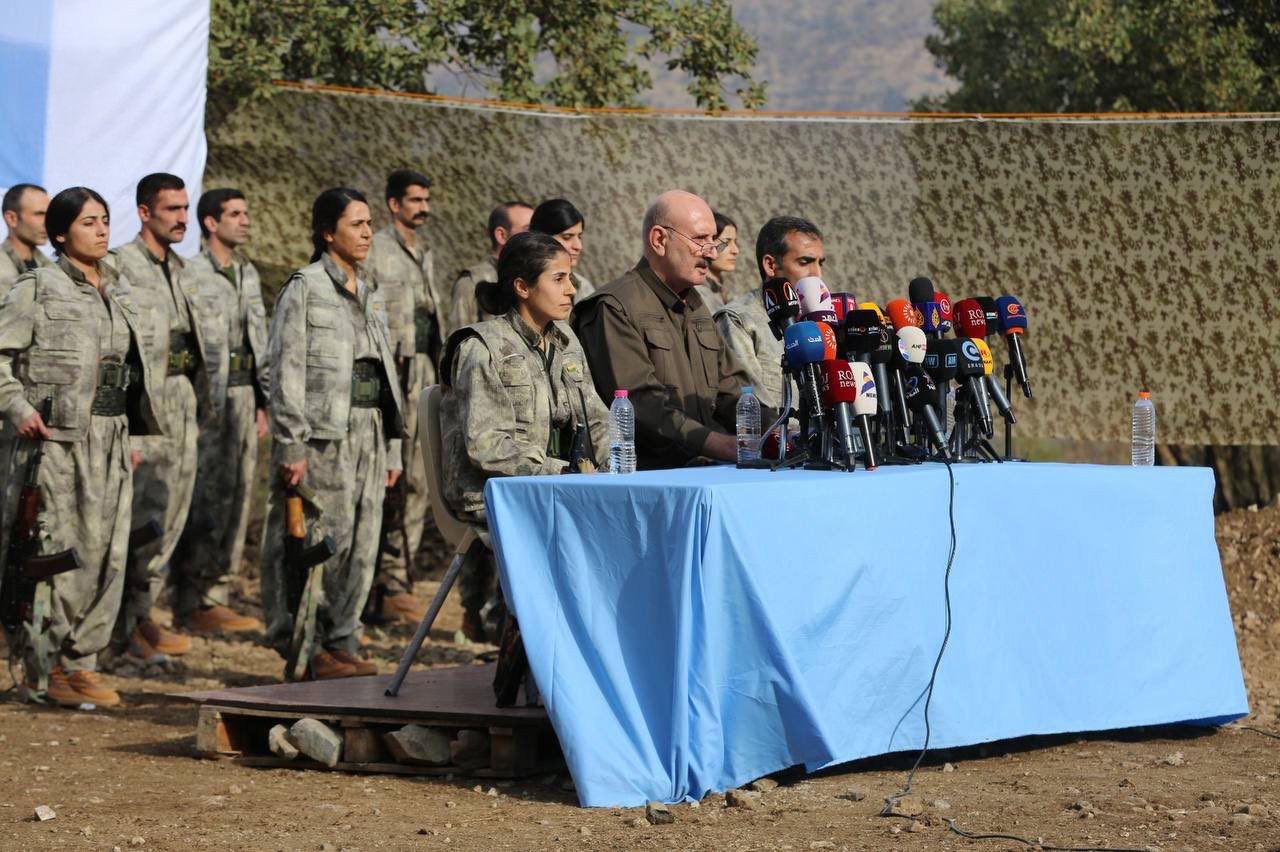What PKK veteran Sabri Ok’s role tells us about the Turkey–PKK peace process

On 26 October 2025, at a press conference on the southern edge of the Qandil Mountains near Ranya, in territory controlled by the Patriotic Union of Kurdistan (PUK), veteran PKK figure Sabri Ok announced that the PKK had withdrawn all of its fighters from inside Turkey as part of the ongoing peace track with Ankara.
Context: This should not be underestimated. The PKK twice attempted to withdraw from Turkey—following Öcalan’s calls in 1999 and 2013, and neither effort fully succeeded. That record makes the latest announcement significant and a useful indicator of why this process may differ from earlier attempts.
On 27 February 2025, PKK leader Abdullah Öcalan issued a public call for the PKK to lay down its arms, convene a congress, and dissolve itself. The organisation later said it had held its 12th Congress on 5–7 May and voted for self-dissolution. On 11 July, at a ceremony in Jasenah Cave on the border of the PUK-controlled Dukan district in Sulaimani province, a group of PKK guerrillas burned their weapons as a goodwill gesture to advance the peace process in Turkey.
Analysis: Ok has been central to the conflict’s long arc. He is one of the organisation’s original cadres, accused of planning the 15 August 1984 raids on security posts in Eruh (Siirt) and Şemdinli (Hakkâri), attacks widely regarded as the opening of the PKK–Turkey armed conflict. He spent twenty years in prison, became the organisation’s lead on prison affairs, and was drawn into contacts with the state as early as 1997 while still incarcerated. Released in 2005, he did something striking: he reported for compulsory military service in Manisa, western Turkey. He wanted to remain in Turkey and had been involved in setting up the pro-Kurdish Democratic Society Party (DTP); he might even have become one of its leaders. It was the moment when Erdoğan travelled to the predominantly Kurdish city of Diyarbakır to declare that the Kurdish issue was “my problem,” signalling a Kurdish opening, and when the National Intelligence Organisation (MİT) opened channels to the PKK.
Ok was among those contacted. We know this from the memoirs of Sabri Uzun, the former head of Turkish Police Intelligence, who recounts seeing Ok in 2005 sitting with MİT officers in an Ankara district. The café owner, Uzun writes, calmly pointed out, “Those with him are MİT, and those at the other tables are your intel police.” Uzun says he was encouraged that a political track was being explored—but dismayed that police intelligence was tailing MİT.
That surveillance later hardened into court cases against Ok in three cities, built on informant testimony. In April 2007, Ok left Turkey on his passport. His name resurfaced in the leaked recordings of the 2010 Oslo talks between the PKK and MİT. Ok was among the PKK figures brought to the table. In one exchange that made headlines at the time, senior PKK figure Mustafa Karasu suggested that, if the state wished, it could fly the delegation out immediately; the MİT official, Afet Güneş, replied to the effect of, “I can do that right now.” Ok, for his part, noted that while some legal files were being closed, new indictments were being prepared—a reminder that politics and prosecution were moving in parallel. It was the sort of conversation that showed how far the talks had gone, even if they ultimately failed to produce a settlement.
It was also Sabri Ok who, at the Qandil press event four days ago, announced that the PKK had fully withdrawn from Turkey. He knows the state as well as anyone and has been involved in peace efforts for three decades. None of this began yesterday; the parties are not strangers. Neither side can easily trick the other.
For a man nearing seventy, twenty years in prison, the rest in the mountains, deciding, after half a century, to dissolve the organisation, lay down arms, and pull fighters back is not an easy call. These are steps that are hard to reverse. Once a movement declares the age of the gun to be over, dissolves itself, and burns weapons, it cannot simply recruit again for an armed return to the mountains, especially in an era when the time of guerrilla warfare has passed both politically and technologically.
At the press conference, when Kurdish outlets pressed him about the process and Ankara’s sincerity, Ok kept his answers positive. Asked about a “return-home law,” he said: “Legal steps tailored to the uniqueness of this process are needed. As reciprocal steps are taken, the process will gain momentum. We want process-specific laws, not a general amnesty. A fifty-year struggle has brought us here; thanks to Leader Apo (Abdullah Öcalan), we are at a very important stage. There can be special, one-off arrangements limited to this context. We hope the authorities will fulfil their responsibilities.”
So in what capacity did Sabri Ok and his colleagues speak at the press conference? As the “Leadership of the Kurdish Freedom Movement.” Because the PKK, they say, no longer exists. With its 12th Congress, the PKK dissolved itself. For that reason, they no longer use the PKK label or name. For example, when Duran Kalkan announced this step two weeks ago, he did so as a member of the Abdullah Öcalan Academy of Social Sciences.
Although some Turkish and Kurdish nationalist sceptics still dismiss the process as “theatre,” a label now reflexively applied to almost everything, no well-versed observer who follows the issue closely believes that the PKK can dupe the state, that the state can dupe the PKK, that everything is happening in plain view, or that these risks are being taken merely to mislead this group of sceptics.
There is a backstory to every scene of the process we are watching: these steps are the product of negotiations between the Turkish state and the PKK. What we see each time is the outcome of a round, not the beginning of it.









